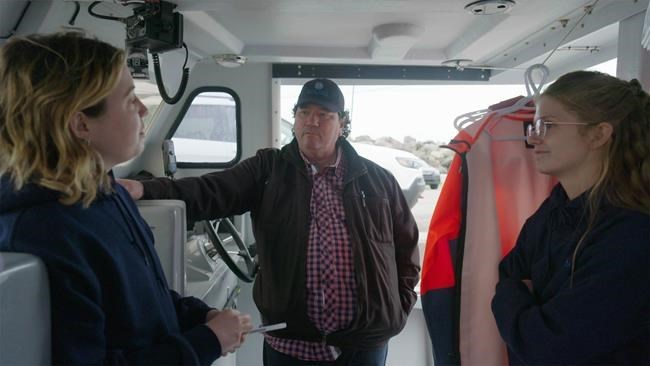HALIFAX — An environmental group has concluded that about 2,300 lobster boats operating off Nova Scotia are suitable candidates to switch from diesel to electric motor, a change that would slash the industry's emissions.
The province's lobster fishery is positioned to lead the way toward zero-emission fishing — if governments assist the boat building sector in developing the new technologies, says a report released Thursday by Oceans North.
Seventy per cent of the fleet fishes within 20 kilometres of their home port, the Ottawa-based advocacy group says, meaning the vessels are able to safely rely on electric power.
Nova Scotia's lobster fleet produces roughly 82 million kilograms of carbon emissions each year — equivalent to the emissions of about 35,000 cars, the study says.
Brent Dancey, director of marine climate action at Oceans North, said in an interview Thursday the move to electric would be most efficient for new vessels, for which energy-efficient hulls could be designed to mesh with the needs of batteries. However, he said boats that are currently operating could also be fitted for electric systems, especially when their diesel engines need to overhauled.
"There will be opportunities on a boat-by-boat basis to do the conversion using the original hull," he said. "It'll take some engineering and feasibility assessments on a case-by-case basis. But we expect there will be opportunities for conversions."
Oceans North says the total cost of an electric system is competitive with diesel over a 20-year horizon because the higher purchase price is offset by lower operating costs.
Under the group's "simplified analysis" of the costs of a 12-metre vessel's propulsion system — assuming the boat would use about 260 kilowatt hours daily of energy — the price for a diesel engine would be $70,000, versus $170,000 for a battery-electric system. But over time, operating and maintenance costs over 20 years for the diesel engine would be about $280,000, much higher than the roughly $85,000 for the battery-powered boat.
The group notes that more study is needed on the economic case for electrification, which includes expected increases in the price of diesel, the likely escalating price for carbon emissions and the inclusion of grants and fuel-switching incentives.
Dancey said the key to getting the shift going is for governments to set a "market signal" by setting clear targets for emission reductions, as has occurred in the motor vehicle sector.
The study calls for Ottawa to include commercial fisheries in its marine climate action plan, and set the goal of having "at least 10 per cent of the lobster fleet, about 300 boats, powered by electricity or zero-emission fuels such as green hydrogen by 2030." It also calls for the federal government to prohibit the sale of new diesel-powered commercial fishing vessels by 2035.
Ottawa has already set a goal that one in five automobiles sold in the country by 2026 will be zero-emission and that 60 per cent of them will be by 2030. By 2035 Canada intends to ban the sale of new internal-combustion engines in passenger vehicles. In 2020, the federal government announced that Canada has the goal of cutting net carbon emissions to zero by 2050.
The report argues that if Canada takes a lead role in the changeover to electric boats, it would create a major boost for the country's boat building industry. It notes there are 15,000 small fishing vessels in Canada and 25,000 of similar size in the U.S., and "all these vessels will need to be replaced or converted … the economic opportunity to modernize Canada's fishing fleet is estimated to be at least $10 billion."
"Building the experience and expertise … before other jurisdictions will position Nova Scotia to lock in economic and social benefits, rather than needing to import expertise and technology," the report says.
This report by The Canadian Press was first published Sept. 21, 2023.
Michael Tutton, The Canadian Press



